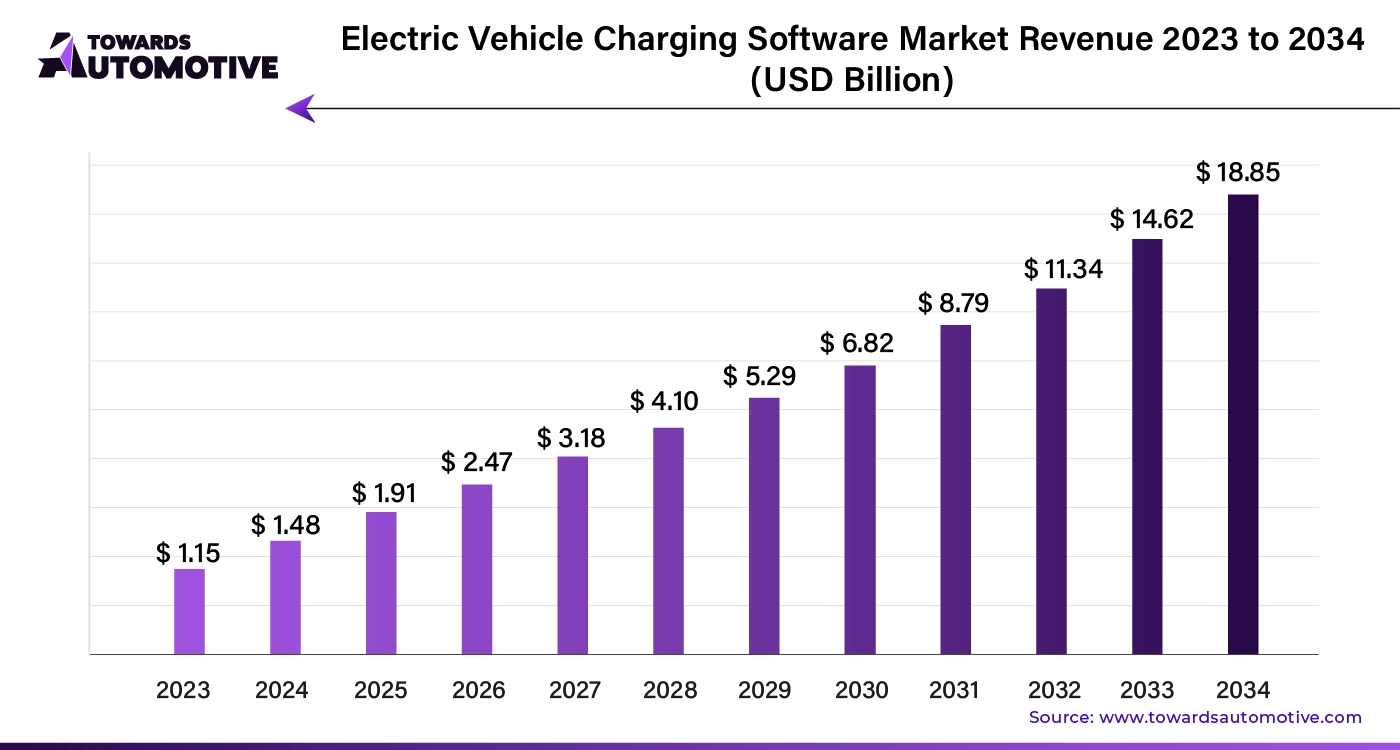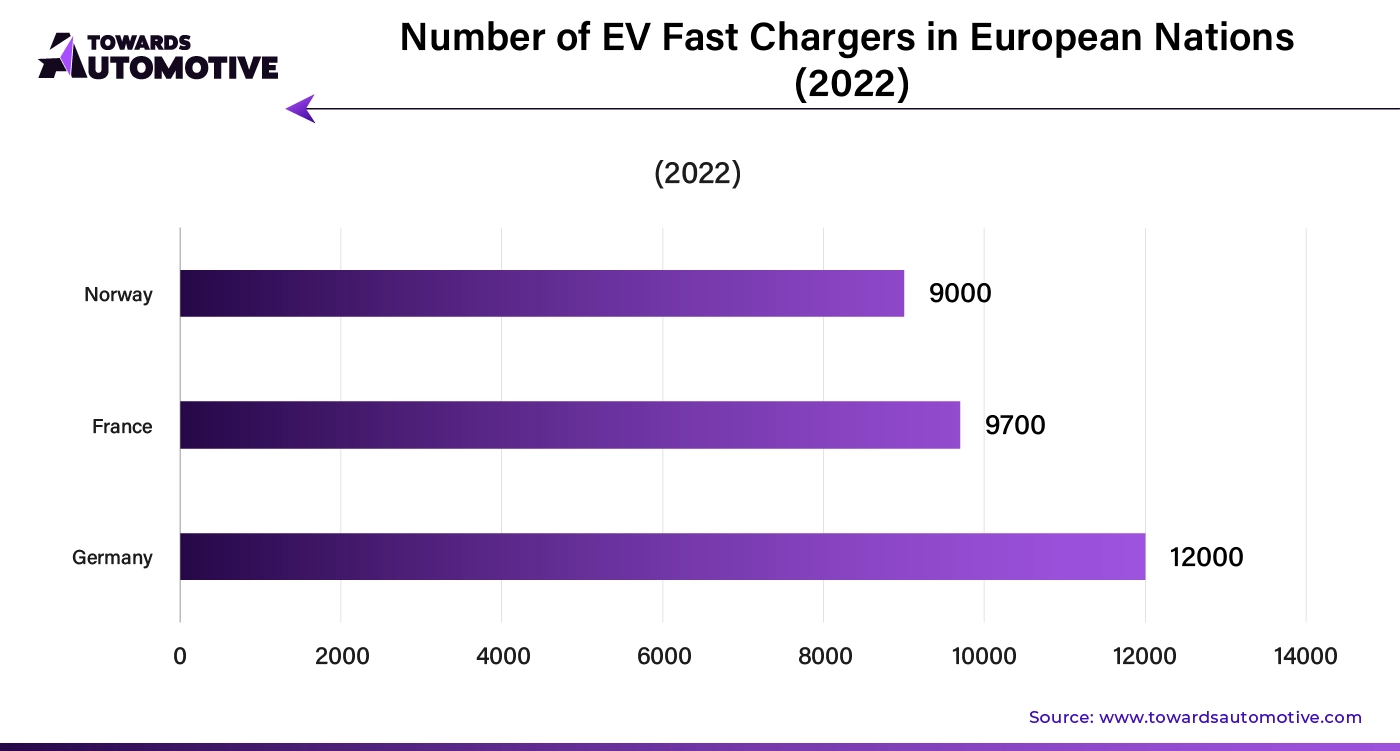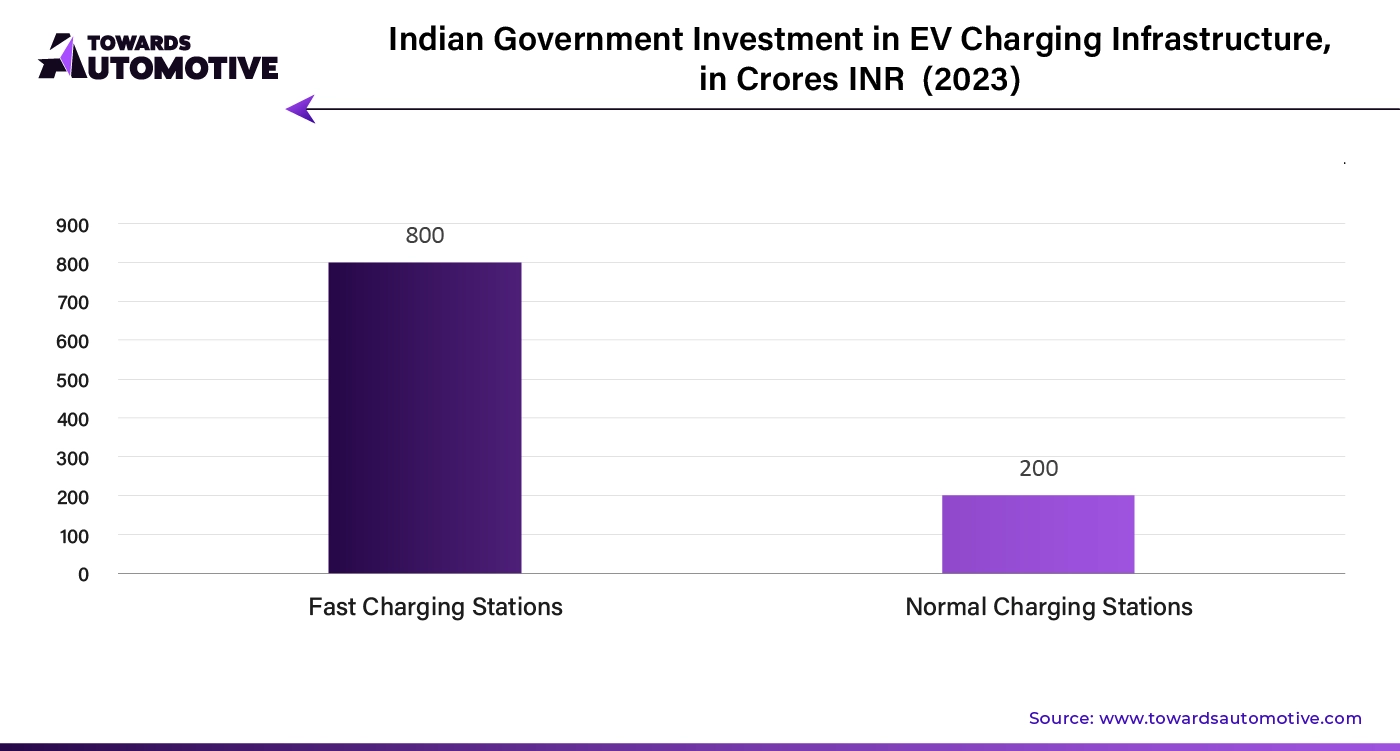April 2025
The global electric vehicle charging software market size is calculated at US$ 1.15 billion in 2023 and is expected to grow with a CAGR of 28.95 % from 2024 to 2034.
Unlock Infinite Advantages: Subscribe to Annual Membership
The electric vehicle charging software market is rapidly evolving as the adoption of electric vehicles gains momentum worldwide. This market encompasses software solutions designed to manage, optimize, and enhance the EV charging infrastructure, ensuring a seamless and efficient charging experience for users. As more consumers and businesses transition to electric vehicles, the demand for sophisticated charging software solutions has surged. These solutions offer features such as real-time monitoring, remote management, and dynamic pricing, which help in optimizing charging station performance and user convenience.
Advanced charging software integrates with various hardware components, including chargers and energy management systems, to provide a comprehensive solution for managing charging operations. It supports functionalities like load balancing, predictive maintenance, and user authentication, which are crucial for the efficient and reliable operation of charging networks. Additionally, charging software platforms often include user-friendly mobile apps that allow drivers to locate available charging stations, schedule charging sessions, and make payments, enhancing the overall user experience.
The growth of the EV charging software market is driven by increasing investments in EV infrastructure, government incentives for clean energy, and the rising need for smart grid integration. As the market continues to expand, innovations in software technology are expected to play a pivotal role in supporting the broader adoption of electric vehicles, making charging more accessible, efficient, and user-ce
AI plays a transformative role in the Electric Vehicle (EV) charging software market by enhancing the efficiency, accessibility, and user experience of charging infrastructure. One of the key applications of AI is optimizing charging operations. AI algorithms analyze real-time data from charging stations, such as energy consumption, user patterns, and grid load, to manage and balance the electrical load effectively. This helps prevent grid overloads and ensures that energy is distributed efficiently across the network.
Predictive maintenance is another critical area where AI contributes. By analyzing historical performance data and detecting patterns indicative of potential failures, AI can predict when a charging station or its components might require maintenance. This proactive approach minimizes downtime and improves the reliability of charging infrastructure.
AI also enhances dynamic pricing strategies. By considering factors such as demand, time of day, and energy costs, AI can adjust pricing in real-time to optimize station utilization and maximize revenue. This ensures that pricing is competitive and reflects the current market conditions.
In terms of user experience, AI-driven software solutions offer personalized recommendations and route planning. AI can suggest the most convenient and cost-effective charging stations based on the driver’s location, route, and preferences. It also enables smart scheduling, allowing users to book charging slots in advance and avoid peak times.
Additionally, AI facilitates integration with smart grids. AI algorithms help manage the interaction between EV charging stations and the grid, enabling efficient energy distribution and supporting the integration of renewable energy sources.
In September 2024, Charge point launched an AI software. This AI based software is designed for repairing and diagnosing EV charging stations.
The rise in the number of charging stations is a significant driver of growth in the electric vehicle charging software market. As the adoption of electric vehicles accelerates, there is a corresponding increase in the need for an extensive and efficient network of charging infrastructure. This expansion creates a growing demand for advanced charging software solutions designed to manage and optimize these charging stations.
With more charging stations being installed, the complexity of managing them increases, necessitating sophisticated software to ensure seamless operation. Charging software solutions equipped with real-time monitoring, load balancing, and predictive maintenance capabilities become crucial for managing a large network of stations effectively. These software solutions help in coordinating the activities of multiple charging stations, ensuring that they operate efficiently and can handle the increased load from the growing number of EVs on the road.

Moreover, the proliferation of charging stations requires robust software to facilitate user interaction, including locating available stations, scheduling charging sessions, and processing payments. As the number of stations increases, the need for user-friendly, integrated software platforms that provide accurate information and a smooth charging experience becomes more pronounced. This growing requirement for comprehensive management and user-oriented functionalities drives the demand for advanced EV charging software, contributing significantly to the market's expansion and innovation.
The electric vehicle charging software market faces several constraints that impact its growth. High implementation costs, including software development and integration with existing infrastructure, can be a significant barrier for both new entrants and established players. Additionally, interoperability issues arise as different charging networks and software platforms may not seamlessly communicate with each other, creating friction for users and complicating software deployment. Limited standardization in charging protocols further exacerbates these challenges. Furthermore, cybersecurity concerns related to data privacy and protection can deter investment and adoption, highlighting the need for robust security measures within charging software solutions.
Blockchain technology creates significant opportunities in the electric vehicle charging software market by enhancing security, transparency, and efficiency in charging transactions. One of the primary benefits of blockchain is its ability to provide a decentralized and immutable ledger for recording transactions. This ensures that all transactions related to EV charging, such as payments, usage data, and energy credits are securely and transparently documented, reducing the risk of fraud and tampering.
Blockchain can also facilitate seamless interoperability among different charging networks and service providers. By using a universal, blockchain-based system for verifying transactions and managing access to charging stations, users can enjoy a consistent experience across various networks and locations. This fosters greater convenience and accessibility, as drivers can use a single platform to interact with multiple charging providers.
Another opportunity lies in smart contracts, which are self-executing contracts with the terms directly written into code. Smart contracts can automate and streamline the billing process for EV charging, ensuring that payments are executed automatically based on predefined conditions. This reduces administrative overhead and enhances the efficiency of financial transactions.
Additionally, blockchain supports energy trading and grid management by enabling peer-to-peer transactions of energy credits and facilitating vehicle-to-grid (V2G) interactions. EV owners can sell excess energy stored in their vehicles back to the grid, and blockchain technology ensures that these transactions are securely recorded and fairly compensated.
The public segment dominated the industry. Public charging infrastructure is a major driver of growth in the electric vehicle charging software market. As the adoption of electric vehicles expands, the demand for accessible and reliable public charging stations grows, necessitating advanced software solutions to manage and optimize these networks. Public charging stations are crucial for supporting widespread EV use, providing essential charging opportunities for drivers who do not have access to home charging. This increased demand for public charging solutions propels the need for sophisticated software that can handle various functionalities such as real-time monitoring, load balancing, and user management.
Advanced charging software plays a vital role in the operation and efficiency of public charging networks. It enables features such as dynamic pricing, which adjusts costs based on demand and energy availability, and provides real-time information on station availability, helping users locate and access charging points easily. Additionally, public charging networks require robust software solutions to handle high volumes of transactions securely and efficiently, ensuring a smooth and reliable user experience.
The expansion of public charging infrastructure also drives software development by creating opportunities for integration with other technologies, such as smart grids and renewable energy sources. Charging software must adapt to these integrations to manage energy distribution effectively and support sustainable practices. As public charging infrastructure continues to grow and evolve, the demand for innovative and comprehensive charging software solutions will increase, fueling further growth and advancement in the EV charging software market.
The level 2 segment led the market. Level 2 chargers significantly drive the growth of the electric vehicle (EV) charging software market by expanding the need for advanced management and optimization solutions. Level 2 chargers, which provide faster charging compared to standard Level 1 chargers, are increasingly deployed in both residential and public settings. Their higher charging speed and efficiency address the growing demand for quicker turnaround times, making them a preferred choice for many EV owners and businesses. This widespread adoption of Level 2 chargers necessitates sophisticated software solutions to manage and optimize their operation effectively.
Charging software for Level 2 chargers includes functionalities such as real-time monitoring, load balancing, and remote diagnostics. These features ensure that the increased number of charging stations operates efficiently, handling higher volumes of usage without compromising performance. Software solutions help in managing peak loads, scheduling charging sessions to avoid grid overloads, and providing detailed usage analytics, all of which are crucial for maintaining the reliability and efficiency of Level 2 charging networks.
Furthermore, as Level 2 chargers become more common in public and commercial settings, there is a growing need for software that supports user-friendly interfaces, payment processing, and integration with mobile apps. This allows users to easily locate charging stations, access real-time information, and manage payments seamlessly. The proliferation of Level 2 chargers thus drives the demand for advanced charging software that can accommodate their specific needs and functionalities, spurring growth in the EV charging software market.
the e-2wheeler segment held the largest share of the market. The e-2Wheeler (electric two-wheeler) segment significantly drives the growth of the electric vehicle (EV) charging software market by expanding the scope and demand for charging infrastructure and management solutions. As the popularity of electric scooters and motorcycles rises, particularly in urban areas with high congestion and growing environmental awareness, there is a heightened need for efficient and accessible charging options tailored to these vehicles. E-2Wheeler users require specialized charging solutions that are often integrated with advanced software to optimize the charging experience.
Charging software for e-2Wheeler segments includes features like real-time station availability, dynamic pricing, and remote monitoring, which are essential for managing a network of charging stations catering specifically to two-wheelers. This software ensures that users can easily locate and access charging points, receive accurate information on charging times, and manage payments seamlessly. Additionally, the e-2Wheeler market's growth pushes for the development of software solutions that support various charging standards and interoperability, making it easier for users to charge their vehicles across different networks.
The increasing number of e-2Wheelers also creates demand for innovative solutions such as smart charging stations that offer rapid charging capabilities and are designed to handle the unique needs of two-wheelers. This drives further investment in charging infrastructure and advanced software technologies. As the e-2Wheeler segment expands, it continues to fuel growth in the EV charging software market by necessitating tailored solutions that enhance user convenience and operational efficiency.
Asia Pacific dominated the electric vehicle charging software market. Rapid urbanization, technological advancements, and expanding charging infrastructure are pivotal drivers of growth in the electric vehicle (EV) charging software market in Asia Pacific. As cities across the region continue to expand, the demand for efficient and widespread EV charging solutions rises correspondingly. Urbanization increases vehicle ownership and traffic density, which necessitates a robust network of charging stations to meet the needs of a growing number of electric vehicles. This surge in demand for charging infrastructure propels the need for advanced software solutions that can effectively manage, monitor, and optimize these networks.
Technological advancements play a crucial role in enhancing the capabilities of EV charging software. Innovations such as smart grid integration, real-time data analytics, and AI-driven optimization enable more efficient energy management and improved user experiences. These technologies facilitate load balancing, predictive maintenance, and dynamic pricing, making it possible to handle the complexities of an expanding charging network and ensuring reliable service for users.
The expansion of charging infrastructure itself is a significant factor driving the market. As more charging stations are deployed across urban and rural areas, there is an increasing need for sophisticated software to manage these assets effectively. This includes functionalities for station location, availability, and user authentication, as well as integration with mobile apps for a seamless charging experience. Together, these elements contribute to the growth of the EV charging software market, supporting the region's transition to cleaner transportation and sustainable energy practices.

According to the world Bank statistics, the government of India invested Rs 1000 crores for developing EV charging infrastructure across the country. From this funding, around Rs 800 crores will be used for setting up fast charging stations and Rs 200 crores will be used for deploying normal charging stations.
Europe is expected to grow with the fastest CAGR during the forecast period. Increased electric vehicle (EV) adoption, heightened investment and partnerships, and robust government policies and regulations are key drivers of growth in the electric vehicle charging software market in Europe. The rising adoption of EVs across the continent accelerates the need for comprehensive and efficient charging solutions. As more consumers and businesses transition to electric vehicles, the demand for advanced charging software that can manage and optimize the expanding network of charging stations becomes critical.
Additionally, significant investments from both public and private sectors fuel the development of charging infrastructure and technology. These investments enable the deployment of cutting-edge software solutions that enhance charging station management, user experience, and integration with emerging technologies including smart grids and renewable energy sources. Strategic partnerships among technology providers, automakers, and energy companies further drive innovation and expand the availability of sophisticated charging software.
Strong government policies and regulations also play a pivotal role in shaping the market. Europe's stringent emissions targets and supportive regulations for EV adoption, such as subsidies, tax incentives, and infrastructure funding, create a favorable environment for the growth of the charging software market. These policies not only encourage the installation of new charging stations but also drive the demand for advanced software solutions that ensure efficient and reliable operation of the charging network.
By Charging Site
By Charger Type
By Vehicle Type
By Region
April 2025
April 2025
April 2025
April 2025
Dr. Arjun Patel is a distinguished expert in the automotive industry, holding advanced degrees in Automotive Engineering and Mechanical Engineering. His expertise spans automotive market dynamics, technological advancements, and sustainable practices. Dr. Patel excels in conducting in depth research and analysis on market trends, consumer preferences, and the economic implications within the automotive sector. He is renowned for his insightful publications on topics such as electric vehicles, autonomous driving technologies, and the evolution of sustainable transportation solutions. Dr. Patels research contributions have significantly advanced understanding in the field, earning him recognition as a leading authority in automotive research and analysis.
We offer automotive expertise for market projections and customizable research, adaptable to diverse strategic approaches.
Contact Us